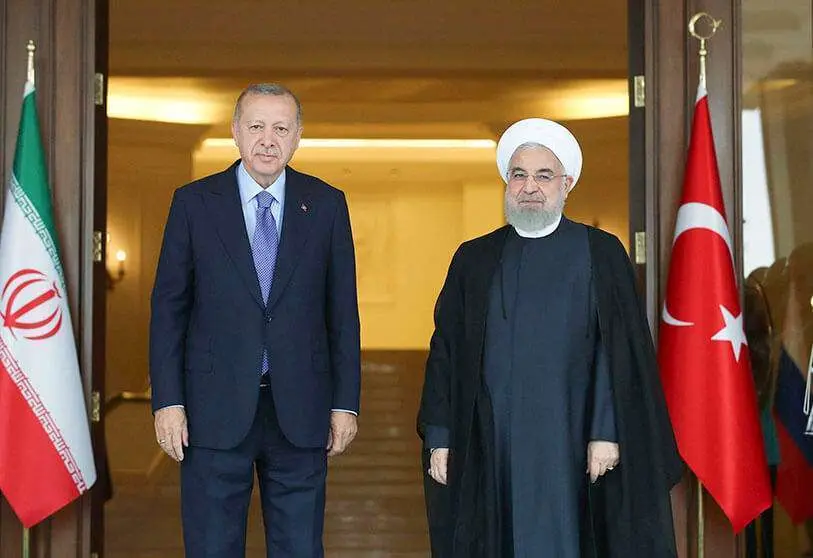What is Iran's position in the conflict of Libya?

The crisis of legitimacy suffered by the Iranian regime and the coronavirus pandemic that has killed more than 7,600 people has drawn attention away from the situation in Libya, a conflict that is keeping many countries in the region on edge. The authorities in the east led by General Jalifa Haftar control most of the country and since last April have been trying to extend their power in the regions still in the hands of the National Accord Government (NAG), based in the country's capital. Haftar is supported by Russia, Egypt, the United Arab Emirates and Saudi Arabia, while the Tripoli government, backed by the Muslim Brothers, receives military aid from Turkey and Qatar.

Iran views the situation in Libya with caution and considers the Haftar-led militias to be a "victory for the axis of Arab moderation", in particular for Saudi Arabia and the United Arab Emirates, two allied powers in the bloody conflict in Yemen. In this context, Libya is playing its war against its allies in Moscow and Damascus and remaining in the Turkish-Qatari axis with which it is confronted in Syria, as several studies carried out in different research centres of the Islamic Republic have warned.
In this context, the Abrar Study and Research Center in Iran has published a study that explains that "the Libyan scene has witnessed since the overthrow of Colonel Muammar Gaddafi and many of his successive developments and events. Although the Islamic Republic had no key in the Libyan scene, the entry of many regional and international powers into the North African nation, especially the anti-Islamic forces represented by the Kingdom of Saudi Arabia, through their support of General Haftar's forces, could extend their influence over the North African region," according to the Africa Gate News.

The Institute of Contemporary Studies of Tehran in the Persian Gulf and North Africa has held a workshop to analyse the possible involvement of Iran in the conflict that is devastating Libya. The newspaper Al Arab has stated that Tehran is increasingly involved with everything that is happening on Libyan soil and the possible repercussions that this war could have on the mullahs' regime. Iran has made no secret of its ambitions to exert its influence in Africa, ambitions it has been pursuing since the beginning of the various Arab springs.
The role of the Islamic Republic in the region could not be understood without analysing the role played by this country during the Arab Spring. In the case of Egypt and after the February 2011 revolution overthrew Mubarak, the political situation in the country became completely polarised, setting the Muslim Brotherhood against Mubarak's allies, represented mainly by the leadership of the armed forces and the judiciary. The revolution of June 30, 2013 opened the way for an alliance between Tehran and the Brotherhood.

In Morocco, the opposite happened. At the beginning of May 2018, the Moroccan authorities decided to end their diplomatic relations with Iran on the grounds that Tehran and Hezbollah were helping the Polisario Front. According to research conducted by the Abrar Institute "since the Arab spring in Libya, this nation has witnessed many conflicts and divisions. Although the people elected the representatives of the General National Congress CNG in their first democratic experiment, this experience was not successful. The Islamists entered the public domain and imposed their views. These attitudes about society have implications for the Libyans' anger and ended with the first failed coup against the elected legitimate authority, as the US Congress sought with some paramilitary forces to isolate the prime minister," they have stressed.
"The lack of security and stability in Libya and the emergence of the Islamic tendency in political life led the North African nation to enter a new conflict between the liberal and Islamic tendencies" continues the research that adds that this confrontation paved the way for the emergence of the Takfirist currents in the country, which raised the Libyan crisis to a new level.
Libya then became a conflict of interest between all parties involved in the war. The presence of Salafist groups raised concern in Western countries for fear of the return of extremist Islam once again, which led to Fayez Al Sarraj being appointed Prime Minister of the Government of National Accord. "This situation did not completely convince some regional parties, because Al-Sarraj was affiliated to the Muslim Brotherhood movement and the conflict was renewed again between Haftar forces supported by the Emirates, Egypt, France, Russia and the ANG, supported by Turkey and some Western countries," this research concludes.

The conflict in Libya reached a new dimension after Field Marshal Haftar announced the start of an offensive to take control of the capital, Tripoli, in April 2019. Since then thousands of people have lost their lives and instability and insecurity have conquered every corner of this region. According to the Iranian centre, "the entry of Saudi Arabia and the United States into the complicated Libyan scenario is leading the Islamic Republic to study and evaluate its involvement in this conflict". However, Iran would support the ANG, supported in turn by Turkey, a country it faces in the conflict in Syria.
The same research considers that among the reasons for Saudi support to Haftar is the control of Tripoli and the establishment of a Libyan military regime loyal to the kingdom; as well as the application of the Egyptian experience in Libya. In the same vein, according to the study, Saudi Arabia and its allies fear that the Muslim Brotherhood will further increase its influence in the country, a country that has been mired in uncertainty and instability since the fall of Muammar Gaddafi's regime.








